Love Lane Lives
The history of sugar in Liverpool and the effects of the closure of the Tate & Lyle sugar refinery, Love Lane
30 years ago TODAY, 90 day Redundancy Notices were served on Love Lane Refinery workers
Written by Ron Noon at 16:03 on Saturday, January 22nd 2011
“The loss of 2000 jobs near the city centre would be more than the end of a business enterprise - it would obliterate a community.” Michael Otterson Liverpool Daily Post July 8th 1976
“The dole queue on Merseyside, already one of the longest in Europe, is about to be stretched farther by the decision of Tate & Lyle to close its sugar refinery in Liverpool.” The Economist 31.1.1981
..............................................................................................................................................................................................................................................................................................
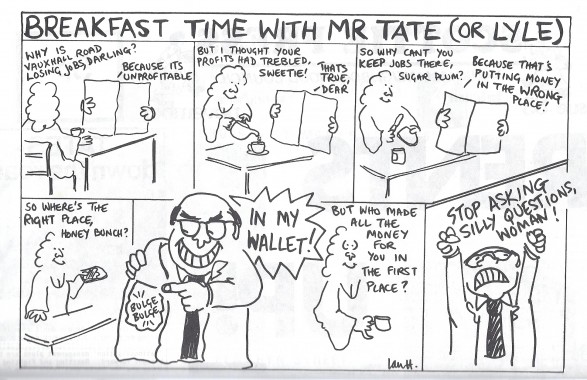 SCOTTIE PRESS, Issue 85, 1978
SCOTTIE PRESS, Issue 85, 1978
Radio Merseyside’s 12 Noon news on the 22nd of January 1981 gave an account of a meeting “at a Liverpool City centre hotel where about 50 union officials were officially told of the closure and the issuing of the 90 day redundancy notices by a Tate & Lyle Director, Charles Runge. There was to be a mass meeting of the work force the next day and the recommendations from the Shop stewards which were to be put to the men and recorded in full by Radio Merseyside, were these:
1. That there will be a unanimous decision by the work force for total resistance to the closure.
2. That all available Trade Union and Political power will be used.
3. That individual letters of redundancy terms be returned to the Shop Stewards.
4. That normal working shall continue until there is a change of circumstance which will warrant a different decision.
The recommendations were read out a second time and carried. “This second performance, the Chairman explained was for the benefit of the representatives of the media who were present” in that hotel, which is just up the side of Lime Street Station and nowadays called THE LINER!
THIS IS THE CHAIRMAN!
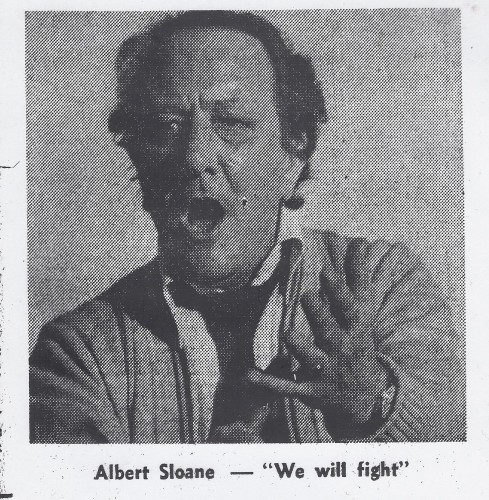
J.A.Watson a former company chemist emphasises just how bitter a blow this closure decision was and how “someone had to achieve in less than three months what they had failed to do in eight years…to pursuade the Government, (as a successor of previous Governments with the same idea), to change its mind”. This was a crisis situation not just for the threatened refinery workers but for the whole of Merseyside which had suffered disproportionately from factory closure after factory closure. A little ditty in the Scotland Road Free Press that was going the rounds went like this: “Redundancies here, redundancies there, Redundancies Redundancies every ****** where!”
The local economy had been reeling throughout the 1970s and the threatened closure of a prominent Liverpool Landmark which had not had a serious industrial relations hiccup since the General Strike in 1926, seemed to portend disaster! “It’s dead now ” said the woman at the beginning of our film. She meant Liverpool not Tate & Lyle and that sense of almost terminal decline and the waste, misery and human suffering of unemployment is surely a message which ought to make us all reflect on the waste, misery and human suffering that is repeating itself again in 2011. Watson was technically wrong about it being an eight year struggle because the first rumours of closure had been in 1971 but effectively the tempo and seriousness of the threats were ratcheted up in 1973 after Britain’s entry into the EEC and its commitment to the “egregious” Common Agricultural Policy” with it’s inbuilt bias towards Continental beet sugar growers rather than the sugar cane supplied by African, Caribbean and Pacific countires to Tate & Lyle’s port refineries. What could be done to change both Tate & Lyle’s mind (remember there was no Tate nor Lyle family member on the board that took the closure decision and local roots and loyalties meant little down in London) and that of Margaret Thatcher’s Government and its Agriculture Minister, Peter Walker?
Peter Hildrew writing in the Guardian the day after the closure announcement quoted BIG JOHN MACLEAN.: “We have been living in an atmosphere of crisis for eight years, but when the blow comes it’s like a sledgehammer in the solar plexus,’ said Mr John Maclean, refinery worker, city councillor, self declared ‘Scouse Nationalist’ and national secretary of the port refineries trade union committee. ‘Part of the structure of the city is being thrown to the wolves in the name of profit, in the name of the Common Market, and in the name of very greedy people. We have kept this place going but for the management we have had only a grudging and almost petulant assent to the idea that it would have gone long ago had it not been for trade union action. They have made the wrong commercial decision in wanting to close their best and original refinery although it should still be needed in future because the Third World is not going to go away. For the people of Liverpool it means the dole, a pathway to nowhere. But in the Commonwealth it means actual lives at stake, they are cutting off the outlet for the sugar output of one whole Caribbean island.” Symbol of a sweet past and bitter future 23.1.81 Guardian
John was a life long socialist and was never parochial in his thinking and views, and so the emphasis he placed on the plight of the cane growers, the suppliers to Tates of what Belinda Coote describes as “the hunger crop” (because of the extent to which so many third world economies were dependent on it for scarce foreign exchange),was typical of a man small in stature but who walked his life like a Giant..
Here’s more food for thought from the same Guardian essay:
The refinery “stands in the heart of dockland, a landmark built on a site where sugar has been refined for over 100 years and clearly visible from the nearby city centre, even in the grey mist which accompanied yesterday’s dismal news”.
That same day the local MP, Bob Parry, stood up in the House of Commons to “ask leave to move the adjournment of the House, under Standing Order No 9”, in order to discuss the 90 day redundancy notices issued to Love Lane refinery workers. The speaker would rule this out but not before the passionate “Rob” Parry evoked the magnitude and seriousness of the decision for his Scotland Exchange constituency and for Merseyside generally.
“The loss of so many jobs “is serious enough but my constituency, in which the refinery is situated has already one of the highest levels, if not the highest level of unemployment in the United Kingdom, certainly well above 50%...The Tate & Lyle company, which made the announcement this morning about sacking these people and throwing them on the scrap heap, also announced that its profits had increased…This is the naked and vicious face of capitalism.” That same day the London Stock Exchange reacted to the closure news and the loss of more than 1500 jobs on Merseyside by increasing the value of the company shares by 12p!
Bob Parry also targeted Peter Walker the Minister of Agriculture, noting his absence and saying that he had a lot to answer for. Bob accused him of having tried to ride two horses in the one race and always supporting the sugar beet lobby.
“It would be interesting if, some day, the right hon. Gentleman would tell us how much sugar beet he grows”.
Just after that comment he was reminded by the speaker that he ought not make that kind of speech if his application were granted! Undeterred Bob pointed out that
the “right hon. Gentleman, according to the feelings of the workers in Liverpool, is a twister and has spoke in this House with a forked tongue”.
Bob had to withdraw the twister tag but still maintained that “the Minister of Agriculture has sold these jobs in Liverpool down the river”.
...............................................................................................................................................................................................................................................
We’d be interested in people’s memories of the 90 day Redundancy Notice period and the three months of struggle to try keep the refinery open. There is more to follow in terms of blogs but input from those who experienced that three month period and have particular stories or accounts of those days would be very much appreciated. I’ll close my blog on this historic day with a reminder of how the giant sugar transnational was very much unaffected by local sentiments and even what local managers thought. One of the last of the Tates to go through “the Sugar Mill” was Saxon Tate and Albert E Sloane said that he was a really nice man who most people respected and liked when he “served his apprenticeship” in the Lane! (Saxy was an old Etonian as a young man but young men whether they were from Eton or not had to do a stint getting to know the process,and their workers experiences.)
Tate & Lyle’s management style was consistent with a global trend that had been evolving since the mid 1970s and it was in the 70s that Lord Jellicoe took over as the first outside Chairman of the company. (1978) The ideological baggage of tradition and paternalism was rapidly shunted to the sidelines when Saxon Tate and the “family spirit” gave way to an outsider chairman and Neil Shaw as group managing director.
The appointment of Lord Jellicoe in 1978 as Chief Executive, was very much at the expense of Saxon Tate, the “family” man who had been expected to take control when John Lyle stood down as Chairman. Jellicoe was an outsider who had only been on the board for four years whereas Saxon Tate had served a long and profitable apprenticeship with the Canadian subsidiary Redpath Sugars. From 1972 he had “for all intents and purposes” run the Tate & Lyle group. The introduction of modern methods of management and “the first touch of professionalism from within the board” was directly attributed to his regime. Consequently the consolation job of Group Managing Director, albeit under a son of the “victor” of the naval battle of Jutland, seemed scant reward for such endeavours. The fates seemed to be conspiring against Saxon Tate when in June 1980 he was given the honorary post of Vice Chairman. It was a poignant moment when his executive functions were all stripped away. An even crueller irony was to follow, with the appointment of the Canadian, Neil Shaw as Group Managing Director. This was clearly a reminder if one were still needed that a new day had indeed dawned for the sugar multi-national.
The first time Shaw had taken over from Saxon Tate was at Redpath when both their stars were in the ascendant, but the former subaltern now overshadowed not only the old Etonian, Oxbridge educated, former Life Guards officer, but also the “family spirit” as well. Along with Saxon Tate, the ideological baggage of tradition and paternalism was rapidly shunted to the sidelines. The following year Lord Jellicoe, as Chairman of a Board of Directors “on which there was, symbolically, neither a Tate nor a Lyle”, made the announcement that Love Lane was to close. “Thus the history of sugar refining in Liverpool was to come to an end at the beginning of 1981, after over 150 years of ‘good and loyal services’, owing to the ‘treachery’ committed by a firm which had been born there a little over a century earlier.” (That was Phillipe Chalmin’s comment in THE MAKING OF A SUGAR GIANT. Ironically what we have witnessed this year with the sale of Tate & Lyle sugars to the American Refining Company is it’s UNMAKING.)
Increasingly global perspectives meant that there was a corresponding withering away of national or local roots or loyalties. Much of that was evident before Neil Shaw took over as Group Managing Director, but under him the metamorphosis from what Chalmin describes as a “family and moral community” into a financial community was completed. Shaw had first been appointed to the Board in 1975 but by the mid 1980s he would assume an unprecedented position of power as the company’s first ever Chairman and Chief Executive.
The concept of the rootless firm without national identity, searching the world for low wages and union free environments is not without some substance but most multi-nationals are still locked by culture, tradition and staff into one nationality. The British based Tate and Lyle has witnessed a number of organisational shifts which severely compromised its historic “paternalistic” image. The end of sugar cane time in Liverpool and the blighting of an inner city community was the most dramatic consequence of that change, and was distinctly emblematic of the “soulless global corporation” that Henry Tate, the entrepreneur and philanthropist had unintentionally bequeathed to the world.
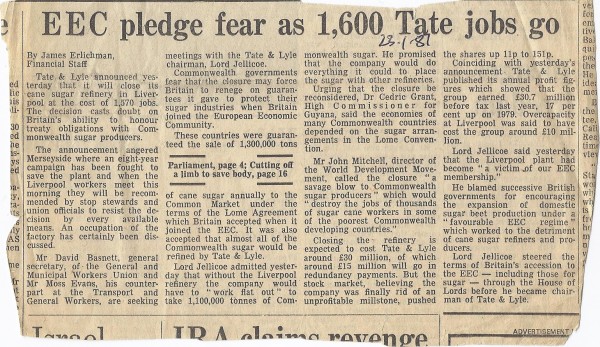
Henry Tate
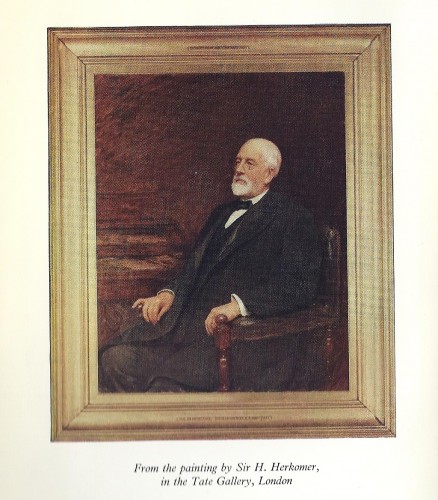
Below Henry is a small picture of the unveiling ceremony on October 3rd 2001 in Hamilton Street Birkenhead and the TATE nearest the blue plaque is the great, great grandson of Sir Henry Tate, Sir Saxon Tate. Next to that scion of the family is Lloyd Grossman!
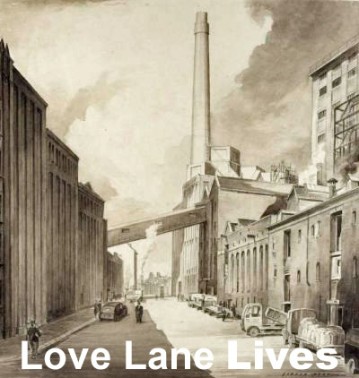
Does anyone recognize these “ladies” from the packin’?
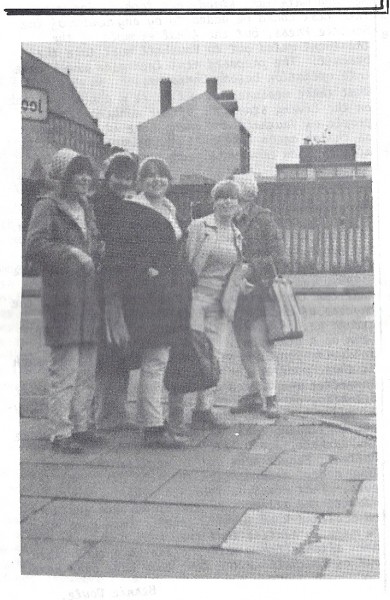
This was an essay written by John (The Scribe as he was affectionately known) in the SCOTTIE PRESS issue 85, 1978
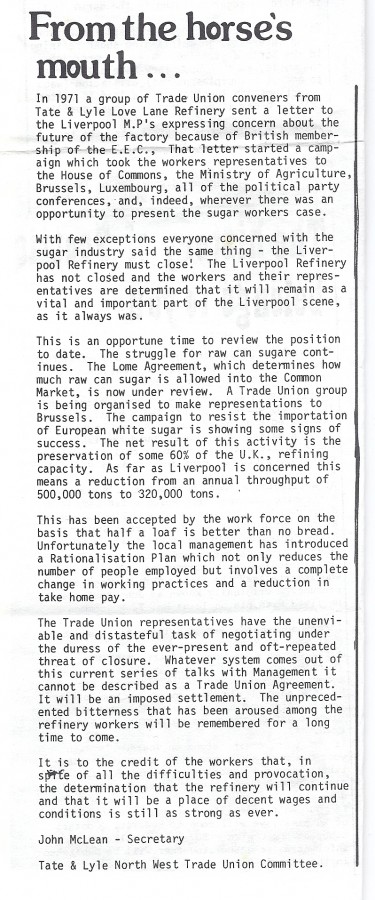
What was Mr Cube’s response to the crisis on Merseyside? Had he kept in training as Lord Lyle had urged back in 1949/1950 when he was so zealous and determined an opponent of nationalisation? Would he be a champion for Liverpool Love Lane?
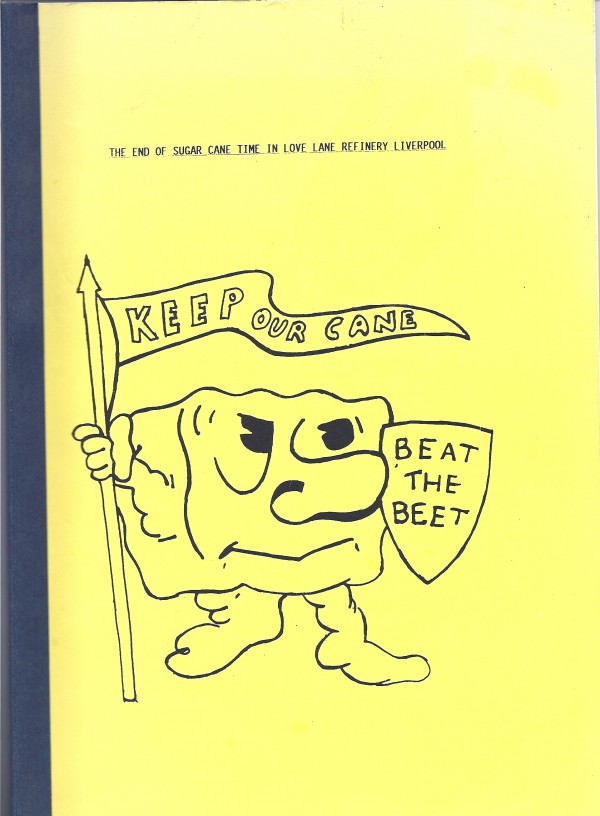
Below are a few pdf files containing contemporary newspaper comment THE DAY AFTER!
Financial_Times_23rd_Jan_1981_and_strong_RECOVERY_for_Tate__lyle.pdfJames_Erlichman_23rd_Feb_1981_1.pdfJames_Erlichman_23rd_Feb_1981_2.pdf